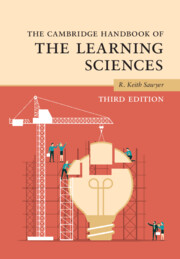Book contents
- The Cambridge Handbook of the Learning Sciences
- The Cambridge Handbook of the Learning Sciences
- Copyright page
- Contents
- Figures
- Tables
- Contributors
- Preface
- 1 An Introduction to the Learning Sciences
- Part I Foundations
- Part II Methodologies
- 9 Design-Based Research
- 10 Analyzing Collaboration
- 11 Microgenetic Methods
- 12 A Learning Sciences Perspective on the Design and Use of Assessment in Education
- 13 Learning Analytics and Educational Data Mining
- Part III Grounding Technology in the Learning Sciences
- Part IV Learning Together
- Part V Learning Disciplinary Knowledge
- Part VI Moving Learning Sciences Research into the Classroom
- Index
- References
9 - Design-Based Research
A Methodological Toolkit for Engineering Change
from Part II - Methodologies
Published online by Cambridge University Press: 14 March 2022
- The Cambridge Handbook of the Learning Sciences
- The Cambridge Handbook of the Learning Sciences
- Copyright page
- Contents
- Figures
- Tables
- Contributors
- Preface
- 1 An Introduction to the Learning Sciences
- Part I Foundations
- Part II Methodologies
- 9 Design-Based Research
- 10 Analyzing Collaboration
- 11 Microgenetic Methods
- 12 A Learning Sciences Perspective on the Design and Use of Assessment in Education
- 13 Learning Analytics and Educational Data Mining
- Part III Grounding Technology in the Learning Sciences
- Part IV Learning Together
- Part V Learning Disciplinary Knowledge
- Part VI Moving Learning Sciences Research into the Classroom
- Index
- References
Summary
Design-based research (DBR) is a methodology used to study learning in environments that are designed and systematically changed by the researcher. The goal of DBR is to engage the close study of learning as it unfolds within a particular context that contains one or more theoretically inspired innovations and then to develop new theories, artifacts, and practices that can be used to inform research and learning in other related contexts beyond the one classroom being studied. In DBR, research improves practice at the same time as it results in fundamental research findings that can be generalized. The widespread use of DBR by learning scientists demonstrates the field’s commitment to impacting classroom practice, and is consistent with a focus on complex learning environments that involve many people in situated social practices.
Keywords
Information
- Type
- Chapter
- Information
- The Cambridge Handbook of the Learning Sciences , pp. 177 - 195Publisher: Cambridge University PressPrint publication year: 2022
References
Accessibility standard: Unknown
Why this information is here
This section outlines the accessibility features of this content - including support for screen readers, full keyboard navigation and high-contrast display options. This may not be relevant for you.Accessibility Information
- 9
- Cited by
